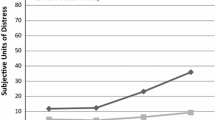Abstract
Contemporary cognitive behavioral theories of psychopathology and therapy assume that people's emotional and behavioral problems are influenced by particular patterns of thought. And yet there is little direct evidence in support of this widespread belief. An experiment is reported that examined the thoughts of people high or low on measures of social-evaluative anxiety and of the tendency to think irrationally. Subjects' cognition was studied under controlled laboratory conditions in the “articulated thoughts during simulated situations” paradigm, in which the subject role-played an audiotaped interpersonal encounter and, at predetermined points, verbalized thoughts elicited by a short segment of the fictitious event. Several findings emerged: Subjects thought less rationally when confronted with stressful situations than with a nonstressful one; subjects high on questionnaire-defined fear of negative evaluation and irrational thinking rated stressful tapes as more anxietyprovoking than did subjects low on these inventories; for highly fearful and irrational subjects, self-reported global anxiety elicited by stressful tapes correlated significantly with irrationality detected in their articulated thoughts. Irrational thinking as measured by articulated thoughts, however, did not correlate with inventories that are expected to predict irrationality in specific situations.
Similar content being viewed by others
References
Beck, A. T. (1967).Depression: Clinical, experimental and theoretical aspects. Philadelphia: University of Pennsylvania Press.
Beck, A. T., Rush, A. J., Shaw, B. F., & Emery, G. (1979).Cognitive therapy of depression: A treatment manual. New York: Guilford Press.
Cacioppo, J. T., Glass, C. R., & Merluzzi, T. V. (1979). Self-statements and self-evaluations: A cognitive-response analysis of heterosocial anxiety.Cognitive Therapy and Research, 3 249–262.
Davison, G. C. (1964). The negative effects of early exposure to suboptimal visual stimuli.Journal of Personality, 32 278–295.
Davison, G. C., Robins, C., & Johnson, M. K. (1983). Articulated thoughts during simulated situations: A paradigm for studying cognition in emotion and behavior.Cognitive Therapy and Research, 7 17–40.
Duncker, K. (1945). On problem solving.Psychological Monographs, (Whole No. 270), 1–113.
Ellis, A. (1962).Reason and emotion in psychotherapy. Secaucus, New Jersey: Lyle Stuart.
Ericsson, K. A., & Simon, H. A. (1981). Sources of evidence on cognition: A historical overview. In T. V. Merluzzi, C. R. Glass, & M. Genest (Eds.),Cognitive assessment. New York: Guilford Press.
Gambrill, E. D., & Richey, L. A. (1975). An assertion inventory for use in assessment and research.Behavior Therapy, 6 550–561.
Genest, M., & Turk, D. C. (1981). Think-aloud approaches to cognitive assessment. In T. V. Merluzzi, C. R. Glass, & M. Genest (Eds.),Cognitive assessment. New York: Guilford Press.
Higgins, E. T., Herman, C. P., & Zanna, M. P. (Eds.). (1981).Social cognition: The Ontario Symposium (Vol. 1). Hillsdale, New Jersey: Erlbaum.
Hollon, S. D., & Kendall, P. C. (1980). Cognitive self-statements in depression: Development of an automatic thoughts questionnaire.Cognitive Therapy and Research, 4 383–395.
Hollon, S. D., & Kendall, P. C. (1981). In vivo assessment techniques for cognitive-behavioral processes. In P. C. Kendall & S. D. Hollon (Eds.),Assessment strategies for cognitivebehavioral interventions. New York: Academic Press.
Hurlburt, R. T. (1979). Random sampling of cognitions and behavior.Journal of Research in Personality, 13 103–111.
Jones, R. G. (1968).A factored measure of Ellis's irrational belief system with personality and maladjustment correlates. Unpublished doctoral dissertation, Texas Technological College.
Kendall, P. C., & Korgeski, G. P. (1979). Assessment and cognitive-behavioral interventions.Cognitive Therapy and Research, 3 1–21.
Klinger, E. (1978). Modes of normal conscious flow. In K. S. Pope & J. L. Singer (Eds.),The stream of consciousness: Scientific investigations into the flow of human experience. New York: Plenum.
Lang, P. J. (1968). Fear reduction and fear behavior: Problems in treating a construct. In J. M. Schlien (Ed.),Research in psychotherapy (Vol. 3). Washington, D.C.: American Psychological Association.
Lazarus, R. S. (1966).Psychological stress and the coping process. New York: McGraw-Hill.
Neisser, U. (1976).Cognition and reality. San Francisco: Freeman.
Newmark, C. S., Frerking, R. A., Cook, L., & Newmark, L. (1973). Endorsement of Ellis' irrational beliefs as a function of psychopathology.Journal of Clinical Psychology, 29 300–302.
Paul, G. L. (1966).Insight versus desensitization in psychotherapy. Stanford: Stanford University Press.
Watson, D., & Friend, R. (1969). Measurement of social-evaluative anxiety.Journal of Consulting and Clinical Psychology, 33 448–457.
Watson, J. B. (1920). Is thinking merely the action of language mechanisms?British Journal of Psychology, 11 87–104.
Author information
Authors and Affiliations
Additional information
This research was supported by NIMH grant MH 24237. Thanks go to Keith Edwards for useful discussions.
Rights and permissions
About this article
Cite this article
Davison, G.C., Feldman, P.M. & Osborn, C.E. Articulated thoughts, irrational beliefs, and fear of negative evaluation. Cogn Ther Res 8, 349–362 (1984). https://doi.org/10.1007/BF01173310
Issue Date:
DOI: https://doi.org/10.1007/BF01173310



